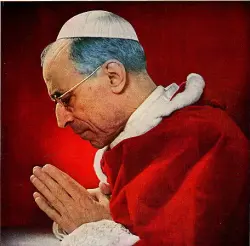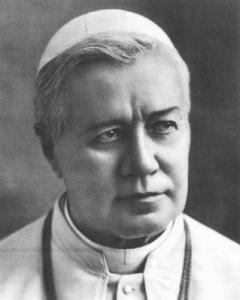Father Garrigou-Lagrange On Deathbed Conversion
Some time ago I read a book from the great theologian Reginald Garrigou-Lagrange, called Life Everlasting.
I have found on the Internet the following excerpt from this book and I remember being as struck now as when I first read it directly from the book.
I copy the passage here in its entirety.
DEATHBED CONVERSION
Deathbed conversion, however difficult, is still possible. Even when we see no sign of contrition, we can still not affirm that, at the last moment, just before the separation of soul from body, the soul is definitively obstinate. A sinner may be converted at that last-minute in such fashion that God alone can know it. The holy Cure of Ars, Divinely enlightened, said to a weeping widow: “Your prayer, Madame, has been heard. Your husband is saved. When he threw himself into the Rhone, the Blessed Virgin obtained for him the grace of conversion just before he died. Recall how, a month before, in your garden, he plucked the most beautiful rose and said to you, ‘Carry this to the altar of the Blessed Virgin.’ She has not forgotten.”
Other souls, too, have been converted in extremis, souls that could barely recall a few religious acts in the course of their life. A sailor, for example, preserved the practice of uncovering his head when he passed before a church. He did not know even the Our Father or the Hail Mary, but the lifting of his hat kept him from departing definitively from God.
In the life of the saintly Bishop Bertau of Tulle, friend of Louis Veuillot, a poor girl in that city, who had once been chanter in the cathedral, fell first into misery, then into misconduct, and finally became a public sinner. She was assassinated at night, in one of the streets of Tulle. Police found her dying and carried her to a hospital. While she was dying, she cried out: “Jesus, Jesus.” Could she be granted Church burial? The Bishop answered: “Yes, because she died pronouncing the name of Jesus. But bury her early in the morning without incense.” In the room of this poor woman was found a portrait of the holy Bishop, on the back of which was written: “The best of Fathers.” Fallen though she was, she still recognized the holiness of her bishop and preserved in her heart the memory of the goodness of Our Lord.
A certain licentious writer, Armand Sylvestre, promised his mother when she was dying to say a Hail Mary every day. He kept his promise. Out of the swamp in which he lived, he daily lifted up to God this one little flower. Pneumonia brought him to the hospital, served by religious, who said to him: “Do you wish a priest?” “Certainly,” he answered. And he received absolution, probably with sufficient attrition [imperfect contrition], through a special grace obtained for him by the Blessed Mother, though we can hardly doubt he underwent a long and heavy Purgatory.
Another French writer, Adolphe Rette, shortly after his conversion, which was sincere and profound, was struck by a sentence he read in the visitors’ book of the Carmelite Convent: “Pray for those who will die during the Mass at which you are going to assist.” He did so. Some days later he fell grievously ill, and was confined to bed in the hospital at Beaune, for many years, up to his death. Each morning he offered all his sufferings for those who would die during the day. Thus he obtained many deathbed conversions. We shall see in Heaven how many conversions there are in the world, owing to such prayers.
In the life of St. Catherine of Siena we read of the conversion of two great criminals. The Saint had gone to visit one of her friends. As they heard, in the street below, a loud noise, her friend looked through the window. Two condemned men were being led to execution. Their jailers were tormenting them with nails heated red-hot, while the condemned men blasphemed and cried. St. Catherine, inside the house, fell to prayer, with her arms extended in the form of a cross. At once the wicked men ceased to blaspheme and asked for a confessor. People in the street could not understand this sudden change. They did not know that a nearby Saint had obtained this double conversion.
Several years ago the chaplain in a prison in Nancy had the reputation of converting all criminals whom he had accompanied to the guillotine. On one occasion he found himself alone, shut up with an assassin who refused to go to Confession before death. The cart, with the condemned man, passed before the sanctuary of Our Lady of Refuge. The old chaplain prayed: “Remember, O most gracious Virgin Mary, that never was it known that anyone who had recourse to thy intercession was abandoned. Convert this criminal of mine: otherwise I will say that it has been heard that you have not heard.” At once the criminal was converted.
Return to God is always possible, up to the time of death, but it becomes more and more difficult as hard-heartedness grows. Let us not put off our conversion. Let us say every day a Hail Mary for the grace of a happy death.
This beautiful passage is, I think, instructive in many ways.
1) Please note how fast the conversion process can be. The episode mentioned by the Cure d’Ars recalls another one in the life of Padre Pio, with the great saint assuring a mother that her son has repented and asked the Blessed Virgin for forgiveness after throwing himself from a bridge.
This doesn’t mean, of course, that such a conversion should be assumed, as it is the scandalous praxis of too many priests nowadays. To do so means to play down the extreme gravity of suicide, and to indirectly cause further ones.
2) Please also note Father Garrigou-Lagranges insistence on these being extreme cases, with the sailor who didn’t even know the Hail mary of Our Father being, in my eyes, the most striking. Powerful, consoling stuff.
3) Particularly notable, please note how strongly the prayer of third parties can, with Mary’s assistance, move the sinner to repentance. The cases of St. Catharine of Siena and of the Nancy chaplain are in my eyes – and someone please correct me if I am wrong – to be interpreted not in the sense that conversion will impose itself on the sinner against his will, but that the prompting to conversion can, through heavenly intervention, become strong enough to reach, together with the collaboration of the sinner, the desired result.
I liked the chuzpah of the chaplain, though….
4) You see here a typical example of what I am tempted to call “South European Catholicism”, to distinguish it from the rigid, protestantised attitude tinged with Puritanism I happen to see in the northern part of the Continent. Once again, we see an approach that whilst doesn’t play down the gravity of the sin, points out to the relative ease with which the direst consequences can be avoided and allows the faithful to live his faith with confidence – the typical attitude in Catholic countries – rather than with fear. I can’t avoid thinking that this confidence is the single most important reason why traditional Catholic countries have – collectively speaking – that striking joy of life that I, alas, never noticed in the north.
5) These examples taken together point out to the absolutely vital necessity of daily prayer. Prayer is what gives us the best cards in our hope to be given final perseverance, and the same Blessed Virgin who helped the sinning sailor just for uncovering his head will very probably take care in her mercy of those who pray to her daily and daily ask her to pray for them in the hour of their death.
As a corollary to this, the great importance of the practice of praying the Rosary and the extremely powerful promises attached to it can never be stressed strongly enough.
I do hope that this little gem of Father Garrigou-Lagrange’s wisdom will help the one or other among the readers; particularly if – as I suppose must happen not infrequently in those parts of Europe, still polluted by Puritan influences – they tend to labour under scrupulosity.
Mundabor
Posted on April 29, 2011, in Catholicism, Good Shepherds and tagged Catholic, Catholicism, Conservative Catholic, conservative catholicism, Deathbed conversion, God, Hail Mary, Jesus, Mary (mother of Jesus), Priest, Reginald Garrigou-Lagrange. Bookmark the permalink. 6 Comments.





















I’ve always loved that sailor story. You’re on the money about the Rosary, too. I’ve seen Fr. Corapi hold up the Rosary saying that it is a Christian’s unbeatable weapon. Rather than the modernist, protestantized Masses, the Church might better have everyone in those Parishes assemble to recite the Rosary.
I wonder how many of our priests in their forties and fifties recite the rosary?
I wonder whether I would want to go to Mass in a church whose priest doesn’t recite the Rosary?
M
Impossible to thank you too much for this.
God bless.
Thanks leftfooter,
An Hail Mary will suffice.. 😉
M
Done!
Thanks!
😉